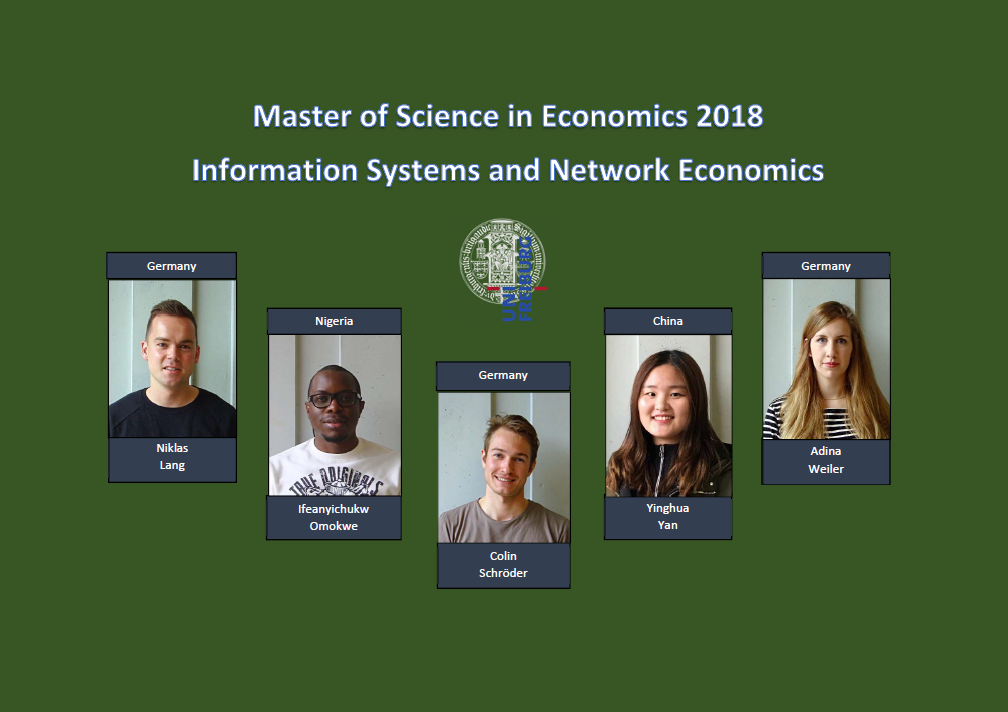The Program
The Freiburg Tradition
Founded in 1457 the Albert-Ludwigs-University in Freiburg is one of the oldest German universities. It is renowned for its excellence and tradition in philosophy and the social sciences. Edmund Husserl's abstract approach towards the role of theoretical reasoning had strong effects beyond the realms of philosophy into the social sciences and, in particular, on Walter Eucken, who made theoretical reasoning a basis for impartial analysis of economic conflict and for impartial policy advice.
The work of the economist Walter Eucken (1891-1950) and the law professors Franz Böhm (1895-1977) and Hans Grossmann-Doerth in the 1930's and 40's about a (new) economic order became the cradle of the "Freiburg School" that provided instrumental concepts and ideas for both the institutional and social order of post-war Germany, the so called "Soziale Marktwirtschaft". Especially, the role of competition as an instrument to balance economic and political power was made a cornerstone of the post-war order and a basis for economic welfare. Thus "Ordnungspolitik", the theory of improving economic and social institutions became a central focus of the research activities of the Freiburg faculty.
Also the work of the late Nobel laureate Friedrich A. von Hayek (1899-1992) on spontaneous economic orders is widely recognized as a contribution to the Freiburg tradition. In his work von Hayek emphasises the role of competition as a mechanism for innovation and the improvement of social institutions.
Von Hayek was awarded the Noble Prize in 1974 for his earlier fundamental insights into the role of the price system for information aggregation in market economies.
With Jan Tinbergen another Nobel laureate is closely affiliated with the faculty. Tinbergen holds a honorary doctoral degree of the University of Freiburg. He is one of the two first Nobel laureates in economics, and a founding father of econometrics and, thus, modern quantitative economic analysis. The statistical tools of modern econometrics are indispensable for comparative empirical institutional research. The rigorous and impartial analysis of economic order and political institutions continues to remain the fo-cus of the research and teaching activities of the Freiburg faculty as expressed in its leitmotiv: "Economic Order and Organization".
Aims and Scope
Our two years' master of science program in economics (M.Sc.) imparts broad analytical competence as well as specific techniques necessary to solve problems specific to the area of the chosen profile: Economics and Politics, Finance, Information Systems and Network Economics.
The master of science program focuses on building up analytical capacities rather than trying to cover all aspects of the field, because we believe that in a rapidly changing economic and business environment it is the ability to identify, structure, analyze, and solve changing problems that matters. Flexibility demands the ability to collect, assess, and process information in an analytical and systematical way rather than to maximize the storage of information that will typically be short-lived and may be very specific to the situation decision-makers are confronted with or the industry they are operating in.
Economics and Politics (EP)
The profile Economics and Politics (EP) focuses on understanding the economic system of modern as well as developing societies.
This includes, but is not limited to, the understanding of the role of institutions on the process of economic policy formation, the interaction between market structure and economic policy, the role of international markets on domestic economic policy, economic and political institution building on the constitutional level as well as sophisticated core economic concepts in the traditional sense. The MEP combines a high level master of economics program with constitutional political economy and public choice theory. It is this interaction between standard economic analysis and political-economic considerations that enhances our understanding of observable outcomes and provides the appropriate tools necessary for their assessment.
Finance (F)
The profile Finance (F) imparts intimate knowledge of the functioning of modern financial markets and financial institutions.
Building on some fundamental theoretical results on financial markets, core topics of the program include the pricing and hedging of financial derivatives, the management and measurement of different sources of risks in financial markets, optimal asset allocation and the construction of investment strategies, the regulation of financial institutions as well as the design and operation of insurance and pension systems. Hence, this program confers in-depth knowledge about ongoing political debates concerning financial markets, about the functioning and regulation of global capital markets as well as about the optimal design of pension systems. The Finance profile represents a high-level master in economics program with a specific focus on the theory and empirical analysis of financial markets demanding a strong quantitative background
Information Systems and Network Economics (ISNE) (in the future, Digital Markets)
The profile Information Systems and Network Economics (ISNE) deals with the economy of linked up systems, as for example information systems. Special subjects address among other things network economy, security on the internet, electronic markets, and strategic management.
Note: During 2023, we are in the process of renaming this profile as "Digital Markets"
Format
Each program teaches up-to-date theoretical economic concepts as well as modern quantitative and management tools necessary to solve concrete as well as abstract problems in the field of study. These techniques are then applied to the analysis of economic policy formation in an international context, the analysis of globalized financial markets and to the most globalized market of all, the internet. Since most problems analyzed are interdisciplinary by their very nature, economics and business administration courses are complemented by political science courses (EP), courses offered by the department of mathematics (F, EP) and by computer science and telematics courses (ISNE). This interdisciplinary approach will put students in a position to evaluate the problems at hand from different angles and find solutions that satisfy not only economics needs, but also political, management, and technological constraint.
Career Opportunities
The program is targeted at post graduates of high potential to be recruited for high and top positions in industry, national administrations, international organizations, non-governmental organizations, and academia. Decisionmaking and management positions demand increasingly broad analytical skills and interdisciplinary knowledge; pure technical or business related skills and experiences will not be sufficient in the near future. Our program reflects these new demands:
We provide students with state-of-the-art economic expertise and management know-how linked with complementary courses from other disciplines.
Thus, our master program focus on people and/or positions that require a broad ranging knowledge and an excellent command of up-to-date analytical and management tools in order to solve complex, multi-level problems in the international market place, the political arena, or in academia.
In particular, targeted jobs include leading positions in:
For the Profile Economics & Politics:
- National governments
- National administrations
- Sub-national governments and administrations
- Academia and relevant research institutes
- Industry and trade associations and NGOs
- International organizations, such as
- International Monetary Fund
- World Bank
- Regional Development Banks
- United Nations and sub-organizations such as United Nations Development Program (UNDP)
- OECD
- European Union
- Management in the business community
For the Profile Finance:
- Financial sector
- Commercial banks
- Investment banks
- Fund management
- Insurance and pension companies
- Consulting and related companies
- The relevant line ministries such as ministry of economics and finance
- National central banks and the European Central Bank
- International organizations such as the World Bank, re-gional development banks, the Bank for International Set-tlements, and the IMF
- Relevant research institutes and in academia
For the Profile Information Systems & Network Economics:
- E-commerce start-ups
- E-commerce and IT management in large enterprises and public administrations
- Consulting
- Management of trust centers and electronic payment
systems - Research (economic research institutes and academia)
Key Competences
The program imparts or enhances a broad range of qualities that will be demanded from tomorrow's decision-makers.
Key competences include:
- Highly developed analytical skills and the ability to apply those to specific problems of the respective field of study
- A profound knowledge of the working of international goods, labor, and financial markets, including their interaction
- A solid understanding of the technological aspects of the working of financial markets and the internet, respectively
- Profound insights into the program-specific economic and management issues from the point of view of government and business with a specific focus on solving problems by setting up appropriate decision making structures, schemes for the gathering of required data and their transformation into useful information, designing and assessing various alternatives, taking actual decisions and putting them into practice with adequate monitoring and reporting structures in order to verify their outcomes
- Understanding of the political-economic aspects of economic policy formation
- Top level managerial skills
- Intercultural sensibility, cultural awareness, and the ability to bridge cultural differences. Communication and other social skills become increasingly important in an integrating world where the remaining barriers are less and less of economic but rather social and cultural nature
- Excellent command of the English language is paramount and a basic knowledge of German is advantageous
The Faculty
|
Prof. Dr. Lars P. Feld (*1966) has held the Chair of Economic Policy and Regulatory Economics at the University of Freiburg since 2010 and is Director of the Walter Eucken Institute. His research focuses on economic policy, finance, new political economy and economic analysis of law.
|
|
Prof. Dr. Germain Gaudin is Professor of Economic Policy with a focus on Competition Economics. He teaches courses related to microeconomic theory, industrial organization, digital and network economics as well as competition economics and policy. After completing his Ph.D. in Economics at Telecom Paris, he held various positions at the University of Düsseldorf, the European Commission and Copenhagen Business School, before joining the University of Freiburg in 2020. His research interests mainly lie in applied microeconomic theory, especially industrial organization and competition economics, with application to digital markets, network industries and retailing.
|
|
Prof. Dr. Roxana Halbleib (née Chiriac) is since 2020 professor of Statistics and Econometrics at the University of Freiburg. She studied Economics at the "Alexandru Ioan Cuza" University of Iasi, Romania, and at University of Konstanz. After obtaining her doctoral degree in Econometrics in 2010 from the University of Konstanz, she went to the Université libre de Bruxelles in Belgium for a one-year post-doc. Between 2011 and 2020, she was post-doc researcher at the Chair of Economics and Econometrics at the University of Konstanz. Moreover, between 2011 and 2016, she was Margarete von Wrangell Research Fellow and between 2013 and 2019, Zukunftskolleg Fellow at the University of Konstanz. Her research interests are at the junction between econometrics, data science, finance and computational statistics. For her research results, in 2017, she was awarded with the Wolfgang-Wetzel-Award of the German Statistical Society. Since 2019 she is a fellow of the Heisenberg Programme of the German Science Foundation.
|
|
Prof. Dr. Tim Krieger is Wilfried Guth Professor of Constitutional Political Economy and Competition Policy. He pursued his undergraduate studies in Kiel and Wisconsin and his graduate studies in Göttingen, Munich and Boston. He received his Ph.D. in Economics from the University of Munich. Before joining the Freiburg faculty, he worked as an assistant professor at the University of Paderborn and as a visiting professor at the Universities of Mainz and Marburg. He is a CESifo Research Fellow, former fellow at Perry World House (University of Pennsylvania) and guest professor at the University of Western Australia. His research interests include international economic policy, political economy, public economics und institutional economics. He has extensively published in international scholarly journals in both economics (e.g., Journal of Public Economics, Journal of International Economics, Journal of Urban Economics) and political science (e.g., Journal of Conflict Resolution, Journal of Peace Research). In the MEP program, his chair offers courses such as Migration Economics and seminars on various topics, e.g., The Economics of Covid-19 and The Economics of Artificial Intelligence.
|
|
Prof. Dr. Eva Lütkebohmert-Holz teaches quantitative finance at the University of Freiburg since 2009. She studied mathematics in Bonn and Toronto and received her Ph.D. in Mathematics at the University of Bonn in 2004. She has been working as research analyst in the Department for Banking Supervision at the Deutsche Bundesbank from 2005-2006 and was Juniorprofessor at the Faculty of Social Sciences and Economics at the University of Bonn from 2006-2009. Afterwards she has been leading the research group "Financial Mathematics: Pricing of Risks in Incomplete Markets” at the Institute for Research in Economic Evolution in Freiburg which was funded by the excellence initiation through the institutional strategy of the University of Freiburg. Since 09/2013 she is Professor of Quantitative Finance at the University of Freiburg. Her research concentrates on the modeling and management of market, credit, liquidity and systemic risks, the pricing and hedging of financial derivatives as well as on methods to account for parameter and model uncertainty.
|
|
Prof. Dr. Bernhard Neumärker is a professor of Economics at University of Freiburg. He received his Dipl. oec. from University of Hohenheim, Ph.D., Habilitation and venia legendi from Ruhr-University Bochum. His professional career is: Assistant professor of economics/public finance at the Ruhr-University Bochum, teaching constitutional public finance and contract economics at the Graduate College "Allocation Theory, Economic Policy, and Collective Decisions" of the Ruhr-University Bochum and the University of Dortmund, Visiting Lecturer of the DAAD at the University of Sofia "St. Kliment Ohridski", Visiting Fellow at the Public Sector Economics Research Centre (PSERC), University of Leicester and Research Fellow at the Walter Eucken Institute, Freiburg. Main research areas are constitutional economics, collective action, economics of contracts, political economy of reform, conflict economics, and economic analysis of social justice.
|
|
Prof. Dr. Dirk Neumann is a professor at University of Freiburg, where he holds the chair of Information Systems as deputy. He obtained a Diploma from the University of Gießen and a Master’s degree in Economics from the University of Wisconsin, Milwaukee. In 2004 he received his Ph.D. from the University of Karlsruhe. His main research areas comprise Market and Service Engineering in service-oriented computing, Grid computing, Supply Chain Management, Green IT and Energy Management. Currently, he is coordinating the EU-funded project “Self-organizing ICT resource Management”, which deals with the set-up of markets in Grid computing environments.
|
|
Prof. Dr. Günther G. Schulze is Professor of Economics at the Economics Department. He received his Ph.D. at University of Konstanz in 1995, went to Stanford University 1995/96 as a visiting scholar, and became assistant professor at the University of Konstanz in 1996 where he received his Habilitation and venia legendi for economics in 2000. He was associate visiting professor for resource economics at the Technical University Freiberg 2000/2001. Since spring 2001 he has been full professor of economics at the University of Freiburg where he holds a chair in international economic policy. His main research areas include international economics, international political economy, development economics, and the economics of terrorism.
|
|
Prof. Dr. Oliver Landmann (emeritus) was Professor of Macroeconomics at the University of Freiburg, Germany, from 1987 until his retirement in 2020. He holds a doctorate from the University of Basel, Switzerland. He has previously worked for the Swiss National Bank and as a Program Director for the Swiss Science Foundation. Also, he has been a consultant to the International Labour Organization (ILO), a member of the Federal Commission for Business Cycle Issues at the Ministry of Economics, Switzerland, and a Visiting Professor at the Universities of Basel, Switzerland, and Nagoya, Japan. He has published widely on macroeconomics, employment theory, and international monetary economics and contributed numerous columns to German and Swiss print media. His current research interests include the Macroeconomics of the European Monetary Union, International Economic Policy Coordination, and the History of Macroeconomic Thought.
|
|
Prof. Dr. Günter Knieps (emeritus) Diplom in economics 1973, Diplom in mathematics 1977, PhD in economics 1977 in Bonn. Habilitation in Berne, Switzerland in 1985. 1988-1992 professor of microeconomics at the University of Groningen, Netherlands. From 1992 to 2019, professor of economics and director of the Chair of Network Economics, Competition Economics and Transport Sciences at the University of Freiburg. He is a member of the Boards of Academic Advisors to the Federal Ministry for Economic Affairs and Energy and to the Federal Ministry of Transport and Digital Infrastructure, a member of the Industrieökonomischer Ausschuss im Verein für Socialpolitik and of the Wirtschaftspolitischer Ausschuss im Verein für Socialpolitik, a member of the Academic Advisory Board of the Walter Eucken Institute, and a founding member of Ökonomenstimme.
|
Partners of our Faculty
What Our Former Students Say
The Master of Science Program in Economics (M.Sc. Ecs.) was launched in 2003. Each year ca. 60 students from all corners of the globe get enrolled and enjoy the high-level, interdisciplinary teaching in their respective field of study. They have become part of a highly motivated international academic community and enjoy their student life in Freiburg.
Graduates are spread across the globe, some have decided to stay in Germany or other European countries to accept job offers, e.g. in the financial sector, or pursue their academic career in Doctoral Programs.
The Master of Science Program in Economics (M.Sc. Ecs.) was launched in 2003. Each year ca. 60 students from all corners of the globe get enrolled and enjoy the high-level, interdisciplinary teaching in their respective field of study. They have become part of a highly motivated international academic community and enjoy their student life in Freiburg.
Graduates are spread across the globe, some have decided to stay in Germany or other European countries to accept job offers, e.g. in the financial sector, or pursue their academic career in Doctoral Programs.
Some statements by our current and former students:
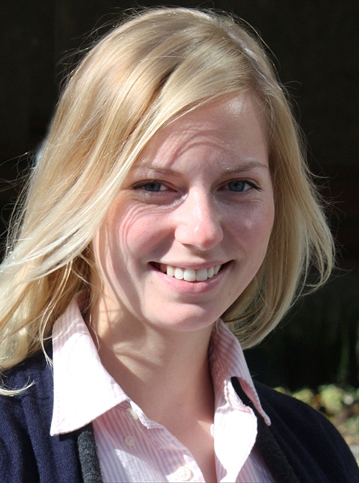 |
Patricia Russ from Germany, Economics & Politics (Intake 2010)My time spent in Freiburg was by far the most intense time of my student life. Coming to Freiburg with a Bachelor of a non-economics related discipline, the first year was not easy. However, I am not exaggerating when I say the solidarity and strong company amongst the students is outstanding – we spent countless days in study groups, helping each other, laughing, and working towards the common goal of passing our exams. Personally, I especially loved that the program is so international, which made it even more enriching. To everyone playing with the thought of coming to Freiburg: Just do it! :) |
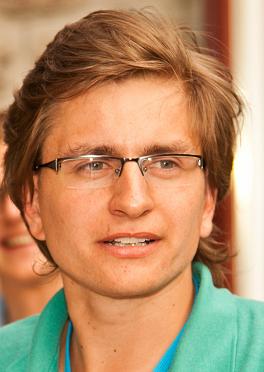 |
Simon Stortz from Germany, Finance (Intake 2010)
Having studied during my Bachelor in a multi-national program, I was impressed from the very first day that the Integrated Master Program, with its internationality and cultural diversity even exceeded my prior experience. In my opinion, the diversity of the IMP students (in our intake, the students were from more than 15 different countries), serves as a unique multiplier. Every student has his or her personal perspective on academic, but also everyday challenges and hence approaches the very same challenge with a different approach. Certainly, this requires also a lot of openness and tolerance for other working styles or cultures. But if one takes on this journey, it is incredibly enriching – not only on an academic level, but also on a personal level. I also completed an internship in the US between my first and second year. As a recommendation: should you plan to work in Germany after graduation, doing an internship is certainly a ‘must-do’ during your Master Program. Now, I am looking forward to the next step: starting my first job after graduation in consulting. |
 |
Wang Chenlei (Tony) from China, MIE (Intake 2007)“As for me, coming to Freiburg is the first time being abroad. In unfamiliar surroundings, without knowing German, it is challenging to live and study here. But, I think it's the best decision I've made in my life, choosing the Integrated Master Program at the University of Freiburg. People are nice and fellow students help me to overcome the difficulties in the studies. For those of you who like challenge and are really interested in Economics, welcome to Freiburg, you won't regret.” |
Keili Oja from Estonia |
|
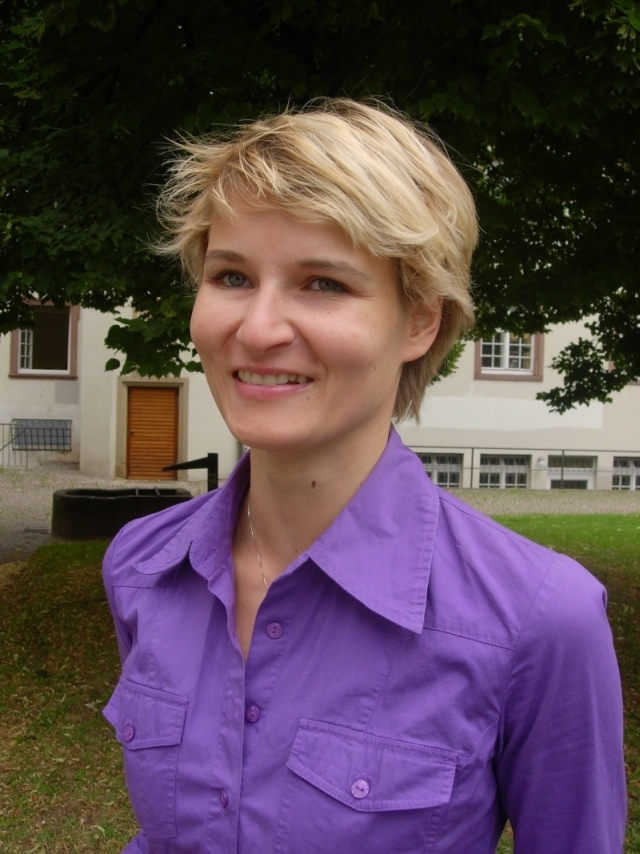 |
MF, Intake 2007 “Hey! I'm Keili from Estonia. I did my Bachelor's studies at Tallinn University of Technology, after which I worked a couple of years as a Bond Dealer at a bank. Both have proved useful here in Freiburg, but doing one of the three IMP programs really takes more effort and intelligence than previous knowledge. It feels good to be back at school after a couple of years of serious office life. Despite hard studies, I think you will enjoy it here too. By the way, you can expect lots of economics - whichever of the three programs you are doing - and a good crowd! P.S. A small tip: to find a room through Studentenwerk you increase your chances if you register online on the first possible chance + call them within some weeks – online registration alone doesn't get you far.” |
Paul Buttenmueller from Germany |
|
 |
MF, Intake 2007 “From my first week in Freiburg I was impressed by the amazing diversity and internationality of the Master Program. In the course of lecture projects and extracurricular activities it is very easy to make friends with fellow students from literally every continent. Now, after almost one year, I appreciate the high academic standards at the University of Freiburg and I am happy to study such a demanding syllabus. In the forthcoming break between my first and second year I am going to join an international Investment Bank as a “Summer Intern”. In a nutshell, I think Freiburg stands for the great opportunity to advance academically, personally and in career terms.” |
Vasyl Kvartiuk from Ukraine |
|
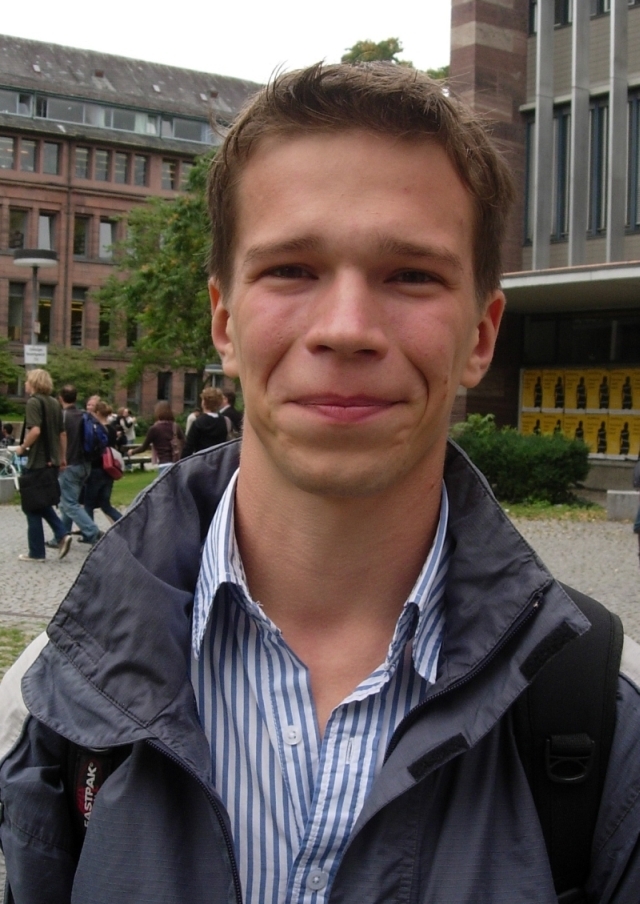 |
MEP, intake 2007 “The IMP in Freiburg is something I decided for after doing my Bachelor in Kiev, Ukraine, and deepen more in social sciences. The Program is pretty unique and challenging in many aspects but the experience you get is crucial for further activity in the field. Along with pretty solid academic knowledge you’ll get invaluable experience of being not only part of German but very international student community. This is definitely a life-changing experience! I’m pretty sure you’ll be proud of yourself after finishing your Master’s here!” |
Joelle Gautier from Switzerland |
|
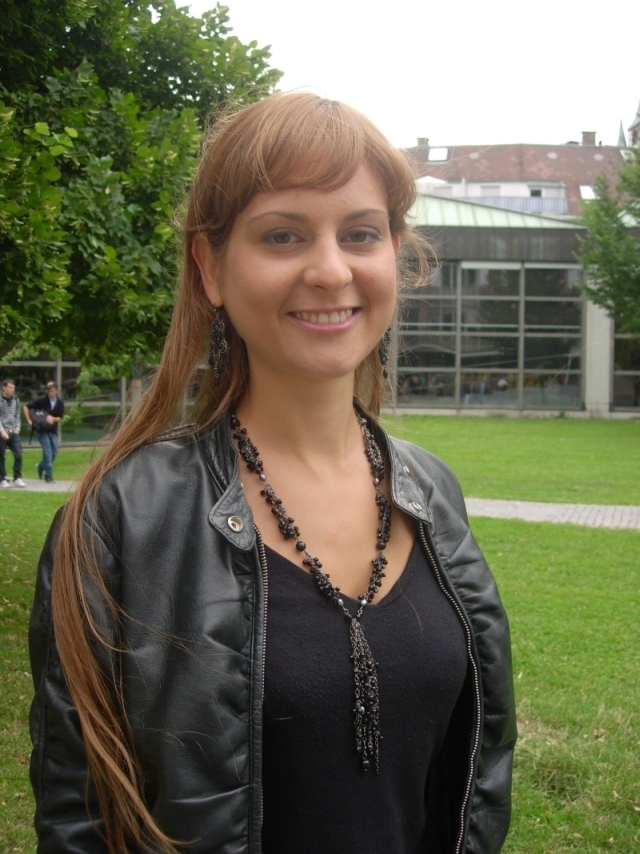 |
MEP, intake 2007 “The experiences I have made so far during my studies in Freiburg differ crucially from my former studies in Switzerland. You will meet people from all over the world and thereby get new insights how various and decisive the cultural, political and economical background can be. Studying in Freiburg definitely gives you the chance to broaden your mind and make many fruitful experiences. |
Wang Hong from China |
|
 |
MIE, Intake 2007 “My name is Wang Hong. I'm an MIE student. This field of studies needs very new ideas as well as up to date knowledge. That's exactly what the professors give us here. And I can say that after a year of studying in Freiburg, I learnt things that will be really helpful for my future. The IMP offers me not only an atmosphere that is good for learning, but also the opportunity to know Germany well and make friends with people from other countries. It's a great adventure for me to study here.” |
Stefan Witte from Germany |
|
 |
MEP, intake 2005 “Freiburg is a nice and popular student town, its university is pretty old and the academic tradition in economics - the ‘Freiburg School’ - plays an important role for the development of economics and politics in Germany. As a student, you will benefit from interesting people around you, good professors, and a nice place to live. The program itself provides you with the competences you need to do research or to get a good job, although the MEP seems to be rather geared towards an academic career. Mind that the program is a real challenge and not everyone coming to Freiburg actually finishes it. Make sure this is what you want to do and you fulfil the prerequisites in order to avoid frustrations. If you are sure you do, there is nothing left but looking forward to it.” |
Hakan Bayram from Turkey (MF, intake 2003, now an Options Trader at Saen Options in Amsterdam): |
|
| "When I first came to Freiburg, I was immediately surprised about the beauty of the city. By time, I met many people from all over the world and I got the academic knowledge and notion I aimed to get before coming there. Now, I am working as a Junior Options Trader in an international environment, and I realize how useful all those great experiences in Freiburg are. Thanks to all my professors, fellow students and all the people who made it possible." | |
Xiaojian Zhao from China (MEP, intake 2003, now a PhD student at Mannheim University): |
|
| "The past two years as an MEP student in Freiburg have been of critical importance for me. I was able to make a successful transition from a software programmer to a scholar in social science. I believe that, for those of you who are really interested in economic science, this program is definitely the right one. You will enjoy this part of your academic life, and of course, your non-academic life in Freiburg. Have fun!" | |
Maja Tofteng from Norway (MEP, intake 2004): |
|
| "The Master Program provides you with a big opportunity to study economics with people from all around the world. The first year was quite challenging whereas the second year gives you more time to involve into your field of interest and prepare for your final thesis. The beautiful city of Freiburg has a charming and student-friendly atmosphere which also contributes to making the experience of living and studying in Germany unforgettable." | |
Elena Beck from Russia (MIE, intake 2004): |
|
| "I decided to study in the Master Program after four years of working as a manager of the credit department in a Russian commercial bank. This was really a crucial change, which has opened many doors for me in several aspects of life. First, I have met a lot of interesting people from different countries of the world and have learnt more about their culture. Second, I was able to overcome intellectual challenges of the program and develop a global approach in thinking about national and international economic issues of today's world. Third, I am sure now that the Master degree will give me a perfect chance to develop my career on a new professional and academic level. And, finally, without any doubts, Freiburg by itself is a joyful city where it is a real pleasure to spend a part of your academic life!" | |
Danilo Avileis from Brazil (MEP, intake 2005): |
|
| "The IMP in Freiburg is a very challenging and interesting experience. You may share with people from all over the world the academic life and thus the difficulties involved when it comes to advanced economic theory. At the same time, you are integrated in the German academic system, since most classes you attend are also attended by regular Diplom-students. A useful piece of advice: study hard your old books of intermediate economics and math for economists before coming here. It´s worth it! About the city: it is very pretty, as well as its surroundings. If you like hiking or biking, you´ll have a great time in the Black Forest!" | |
bw-i study stories:
Mine Devran Aras, Turkey (MIE, Intake 2006)
Antonio Farfán Vallespín, Spain (MEP, Intake 2005)
Current Students
First meeting of the Intake 2020
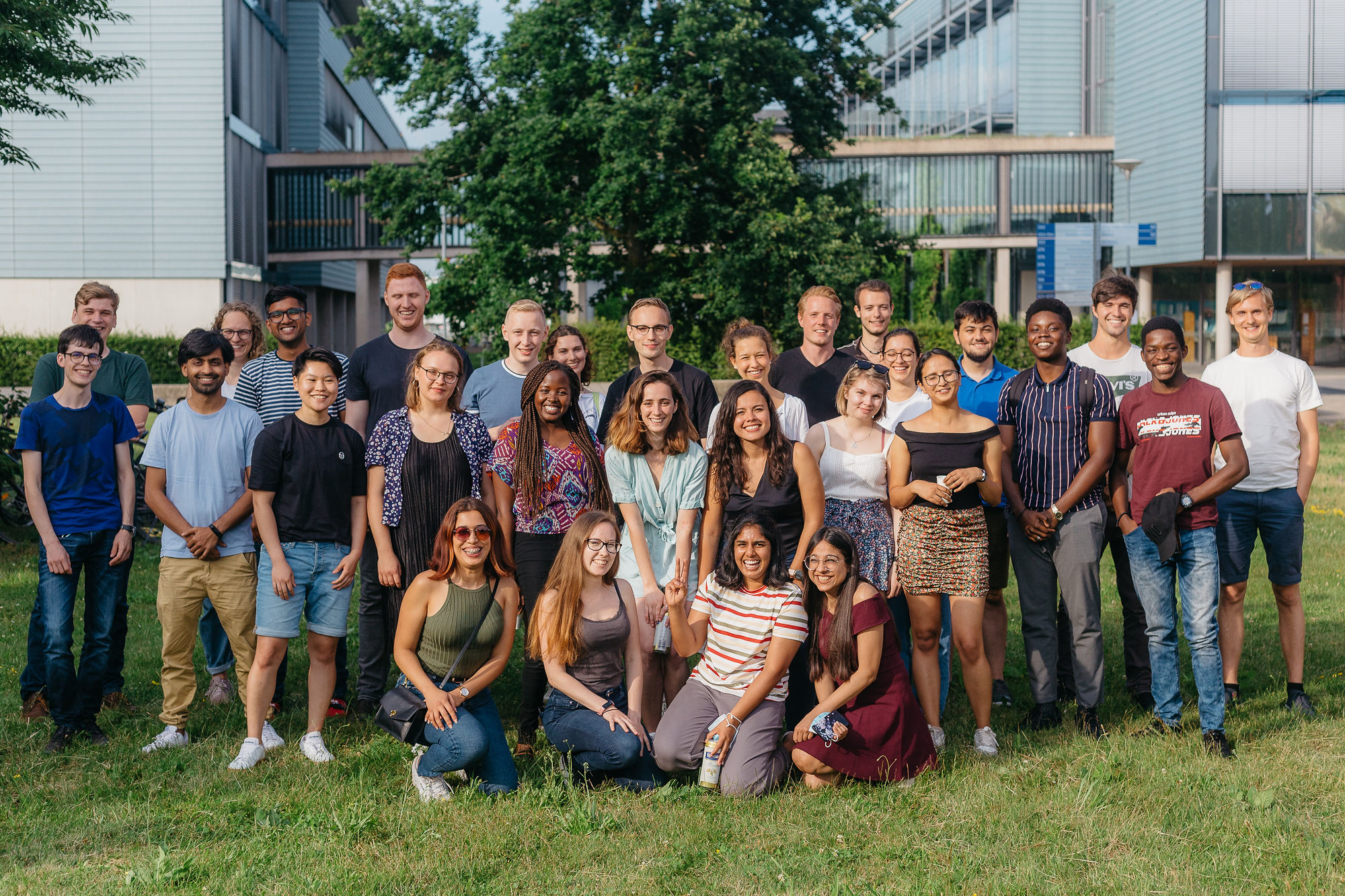
Intake 2019 Economics & Politics
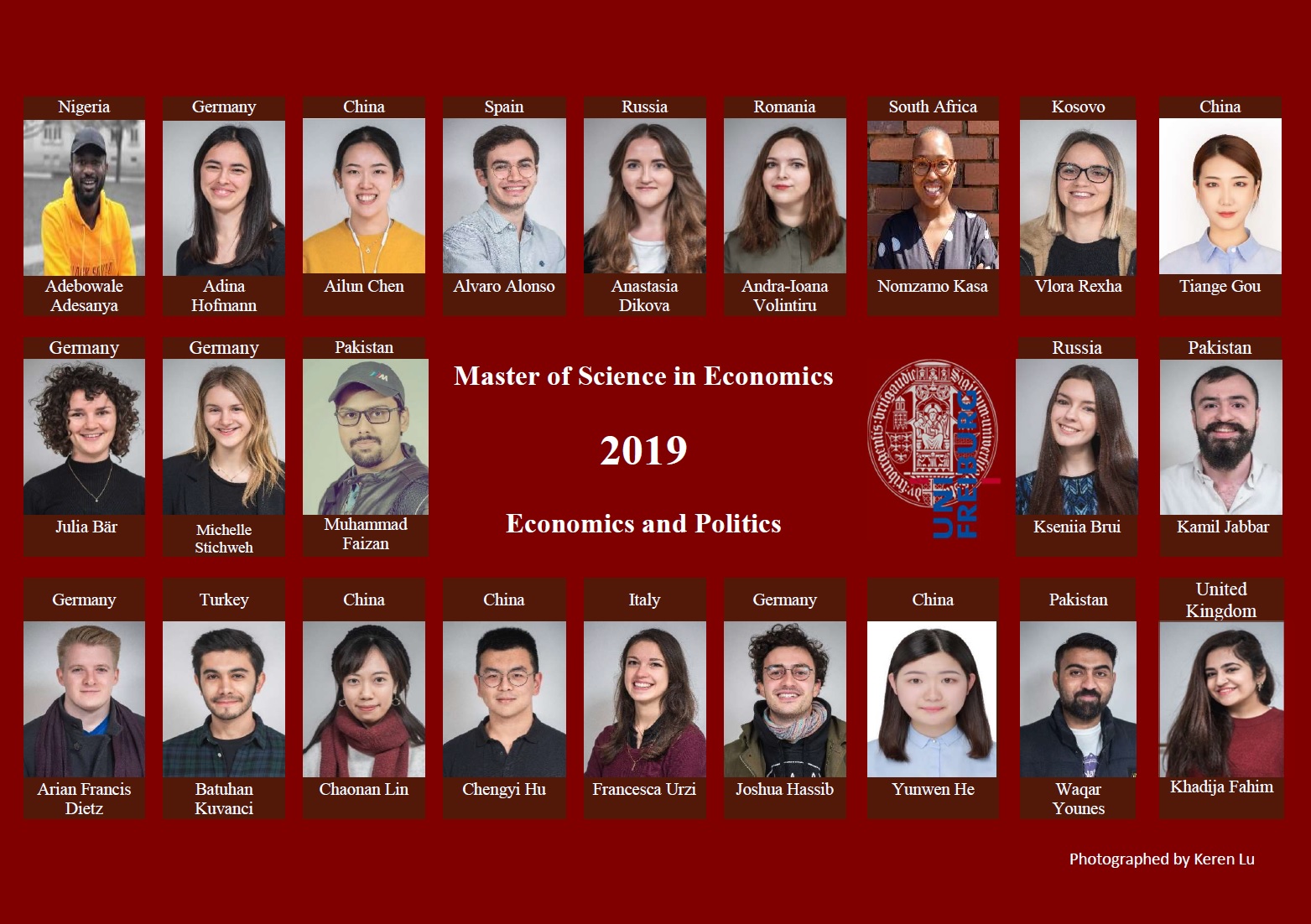
Intake 2019 Finance
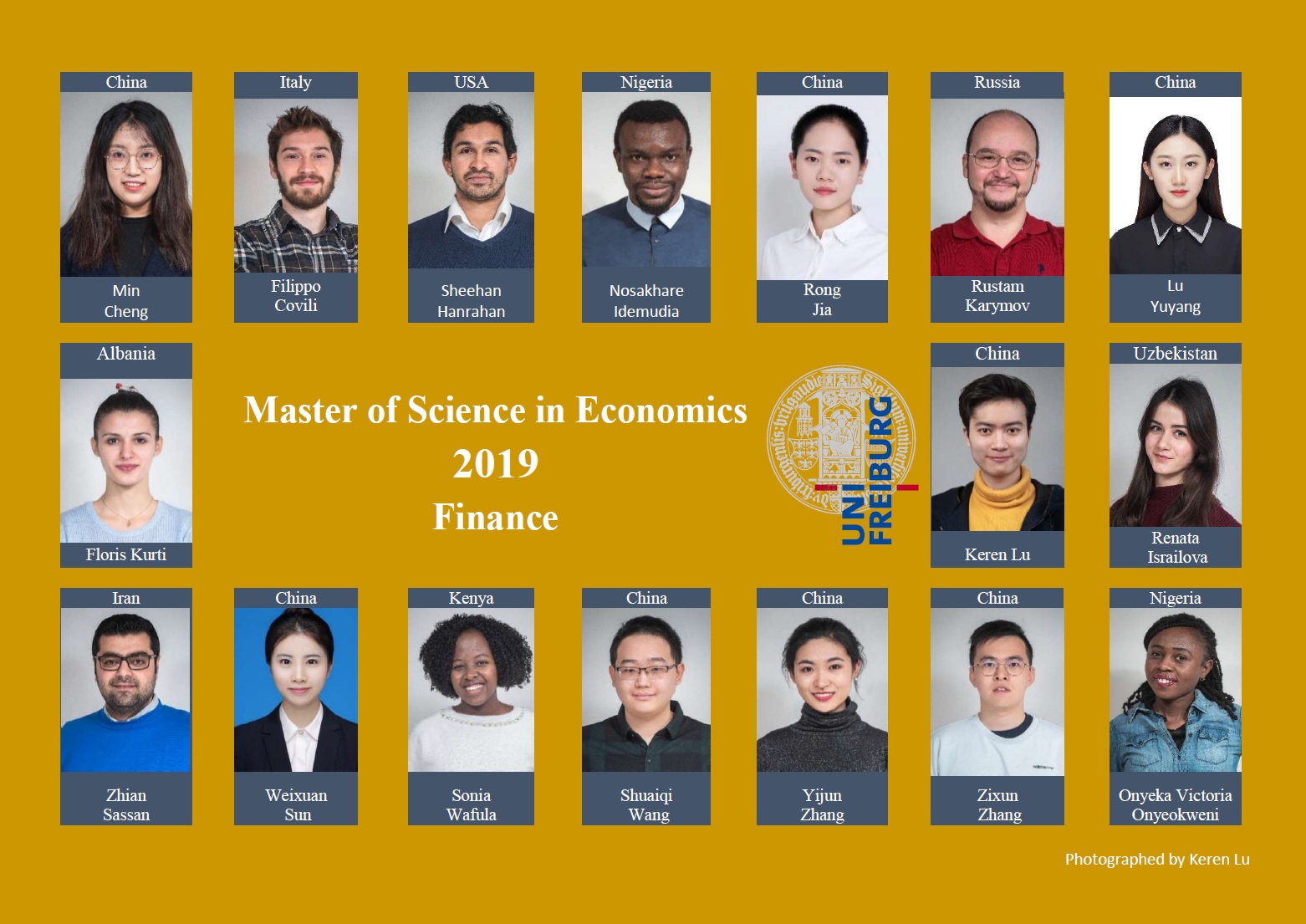
Graduation ceremony 2019
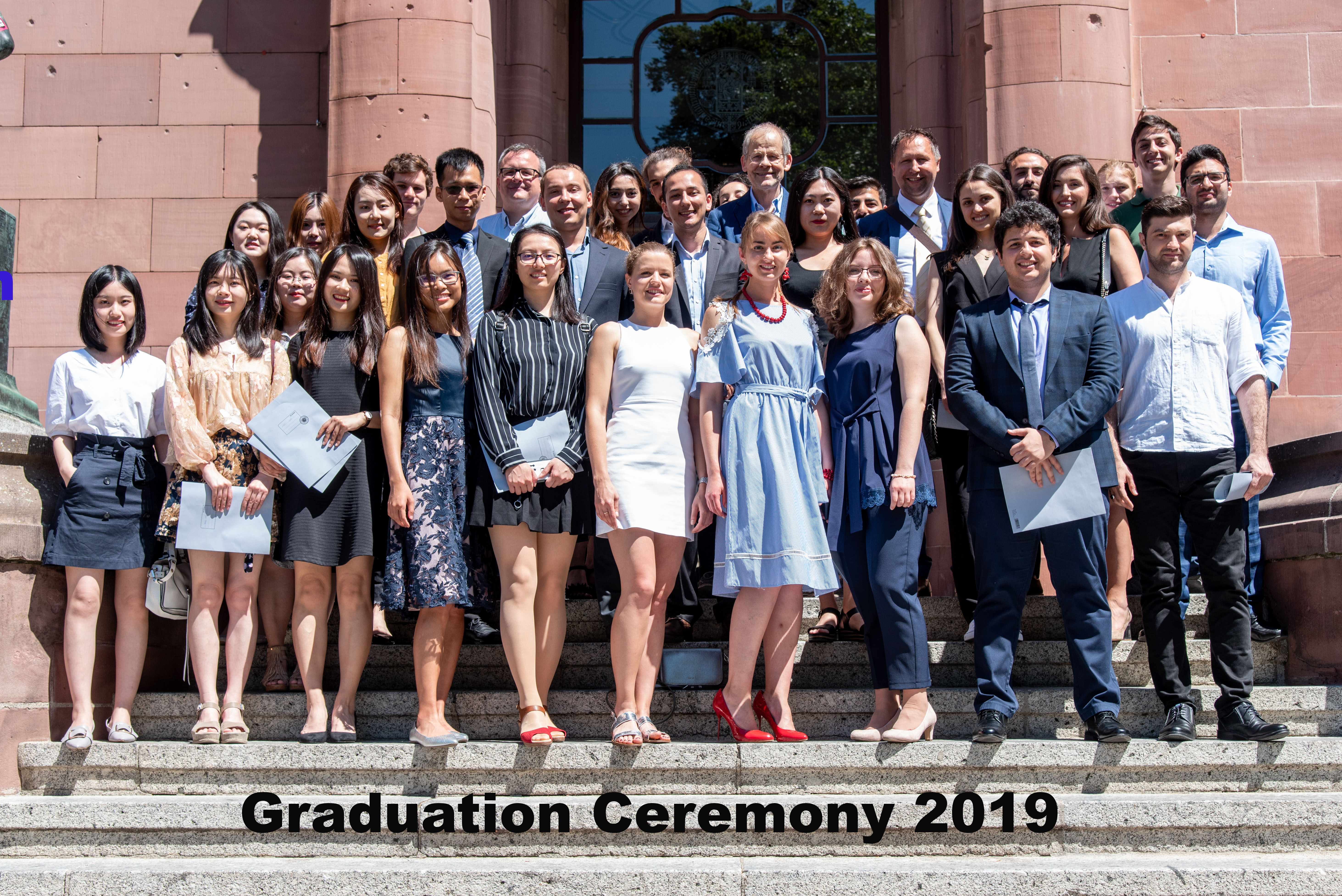
Graduation ceremony 2018
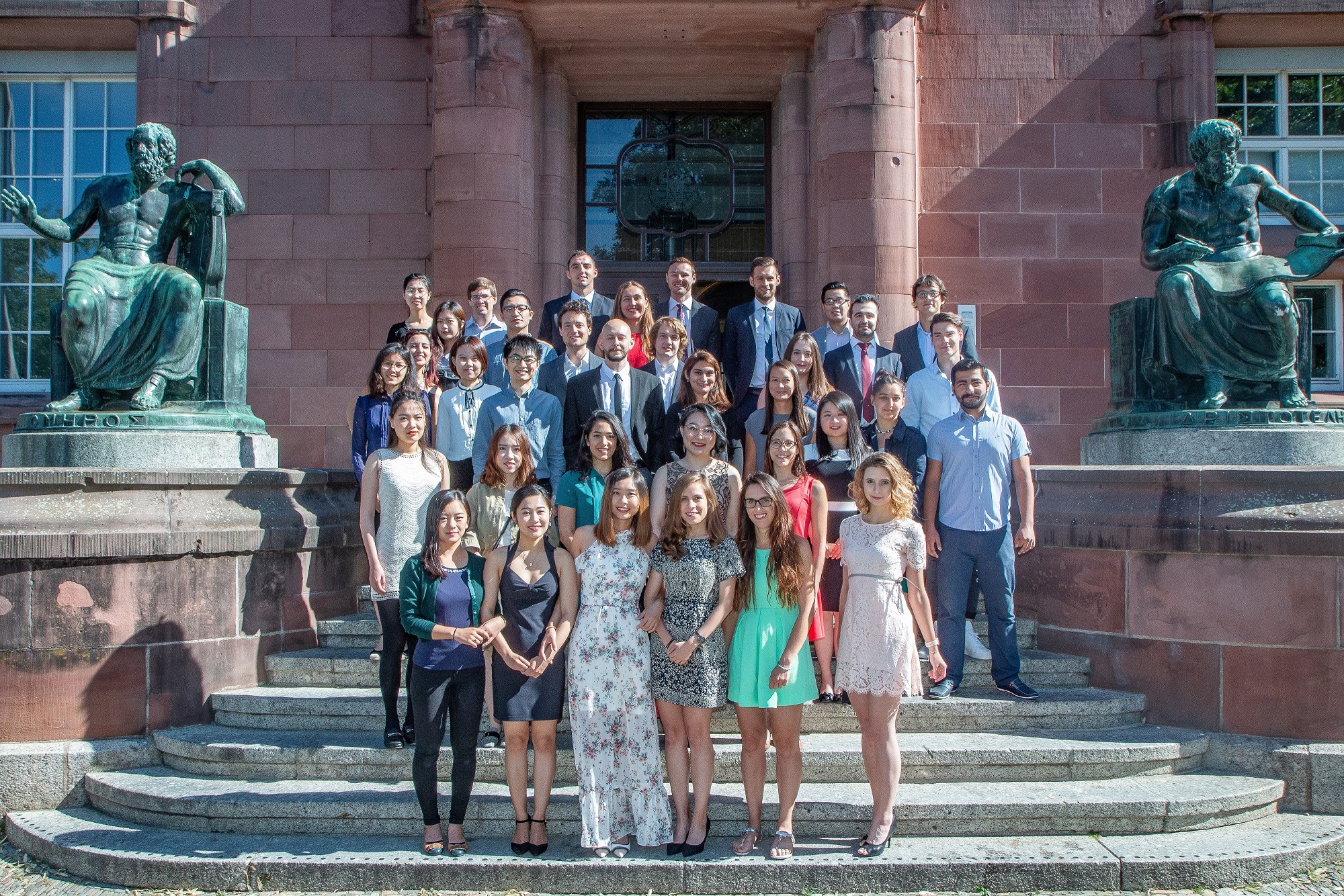
Intake 2018 Economics & Politics 
Intake 2018 Finance
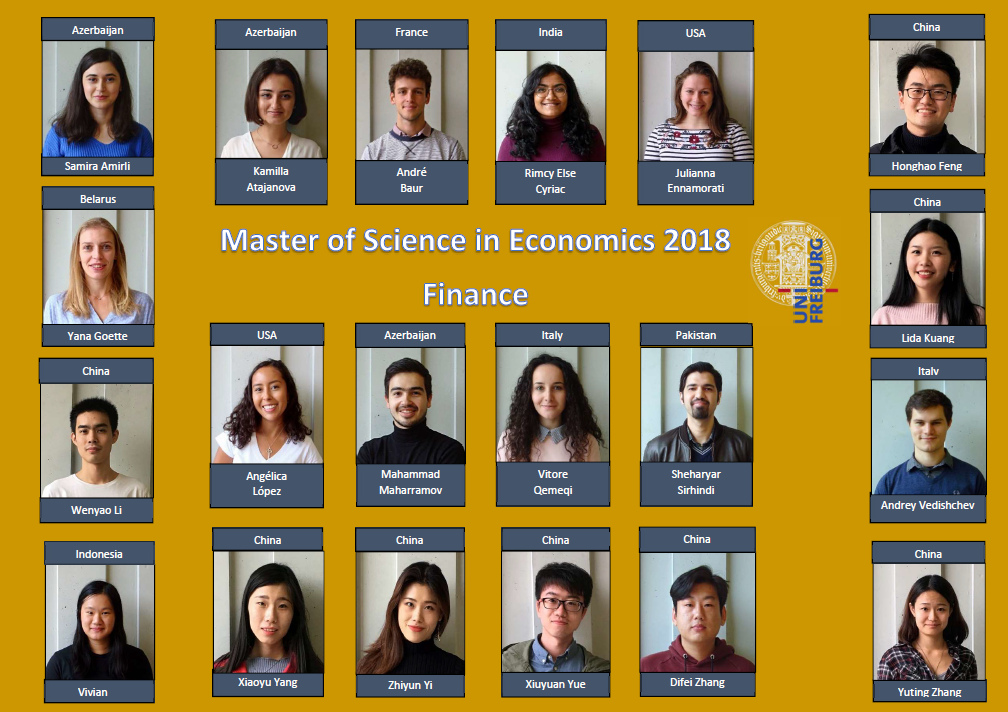
Intake 2018 Information Systems and Network Economics
